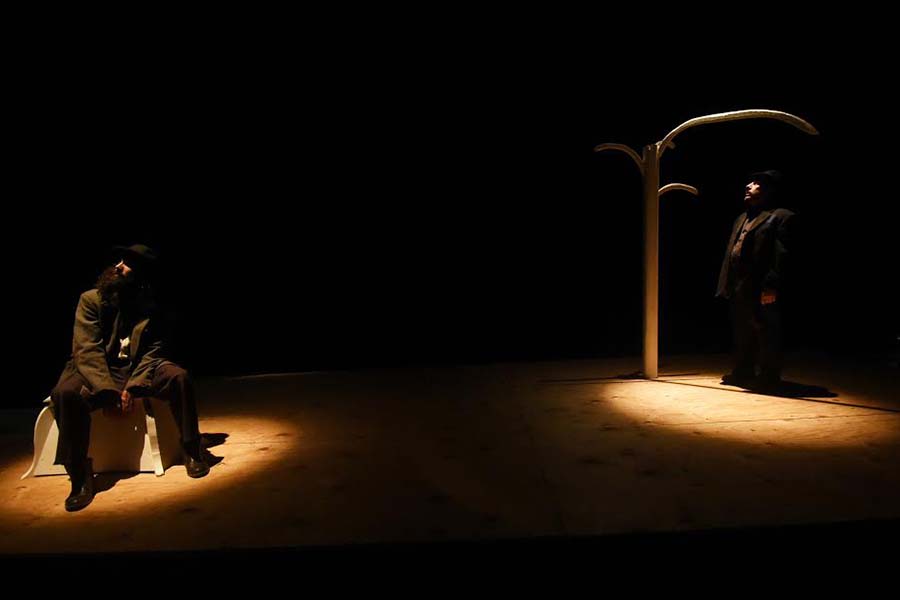Independent theatre and arts group Ad Hoc Beaumont formed with the mission of bringing theatre to everyone, everywhere.
“We do shows wherever we can,” said Michael Mason, who founded the group when he moved back to the mid-size city of Beaumont, Texas, from New York in 2012. “Early on, we were doing it in a house. We’ve done it in warehouses, we’ve done it in abandoned buildings, we’ve done it in a local museum.”
Now Ad Hoc Beaumont can add a Texas prison to that list. On April 26, the traveling actors premiered their production of Waiting for Godot not at the Betty Greenberg Center for the Performing Arts, home of the Beaumont Community Players, where it played for the public through May 6, but at the medium-security federal correctional complex in Beaumont, home to around 1,500 male inmates. The performance was so popular that it will return for an encore this week (on Tuesday, May 10).
Ad Hoc joins a long list of troupes that have performed Waiting for Godot in prison, the most notable being the 1957 performance in San Quentin, which inspired a group of inmates at the San Francisco Bay area prison to start the San Quentin Drama Workshop. Mason admitted he knew little of this legacy going into his troupe’s own production. In fact, Ad Hoc had originally planned to take a different show to a planetarium at a local school. When that didn’t work out, a friend who works as the prison’s reentry and education coordinator suggested the solution.
“He said, ‘You know, I’ve thought about this before: You guys could come in and do something,'” Mason recalled. “‘We have churches come and sing, I don’t see why we couldn’t have a play come in.’”
The next step was figuring out which play to perform. At first they considered Year of the Rooster, which Ad Hoc performed last summer. But Olivia Dufault’s comic play about cockfighting was deemed inappropriate for the prison, Mason said, noting there are regulations against showing anything too violent or sexual. Looking into the tradition of theatre performed in prisons, Mason noticed Shakespeare has been a popular choice, but that didn’t fit with Ad Hoc’s style. Other suggestions included Zoo Story and Jesus Hopped the ‘A’ Train, which takes place on Rikers Island.
But, Mason reasoned, “I didn’t know if these guys would want to see a play about inmates. It seemed too on-the-nose, and just too much of what they’re already dealing with on a daily basis.”
Then someone suggested Godot, which was also on Mason’s general to-do list as a director, and he immediately saw the sense in it. “You have the two guys, they’ve sort of given up control of their own destiny to somebody else, they’re playing by somebody else’s rules,” Mason said. “As Beckett said, ‘There’s meaning where you find it.’”
Sidney Homan, a longtime professor of English at the University of Florida and author of Beckett’s Theaters: Interpretations for Performance, saw a similar connection. When he started a tour of Godot through Florida prisons in the ’70s, inmates in the audience connected with the show so much that they broke the fourth wall, shouting comments and questions to the characters. Homan summed up the relation between the show and prisoners by recalling the final scene, when Vladimir sent his message to Godot: “Tell him you saw me.”
“In that moment, the inmates, who had otherwise been wonderfully enthusiastic, became unbelievably quiet,” said Homan. “They could say that someone saw them.”

Beaumont’s production went one step further: Inmates weren’t just the audience, they also helped to build the set which traveled to the community shows. (It had to be broken down, loaded onto a federal truck, driven to the parking lot, then transferred to the theatre company’s U-Haul.) The inmates worked with plywood and paint, materials they had readily available, and Mason tried to communicate his vision for the sparse set of a country road with a tree. The set builders initially made the tree with huge leaves before Mason asked them to paint it white and make it look ethereal.
One inmate even joined the cast, in the small but pivotal role of the boy. The group had gone through a few actors for the part: one who dropped out for health reasons, another who admitted he didn’t feel comfortable performing in prison, and another who was under 18, too young to enter the facility as a volunteer.
“We struggled for a few weeks trying to fill this very small role,” Mason said. “But it’s an important role, because he is the one that says, ‘Godot will not come today.’”
The reentry and education coordinator at the prison noticed that one gregarious inmate was particularly excited about the show and suggested he could take on the role for the prison performance. The inmate told members of Ad Hoc that he had an acting background—that he had previously read Godot and appeared as an extra on “Friday Night Lights,” Mason said.
Involving the inmates in the production made the process more challenging, especially since there was limited access to the performance space beforehand. The theatre company had limited time to figure out sound and lighting for the prison’s nondenominational chapel.
But it was worth the effort, said Michael Saar, the production’s Vladimir. In addition to usual show preparations, Ad Hoc performers took a course in working as prison volunteers. Saar said he’s performed in non-theatrical locations before, including schools and an Arizona Indian reservation, but never a prison. Although Ad Hoc did not set out to tailor the production to the location, Saar said he knows the experience will affect the performers, and possibly even the community audiences, differently because of the venue.
“It’s always been our focus: What are we giving the prisoners?” Saar wondered. “What are they going to take away from it? Why are we doing it? And the reason for it is to hopefully give them something that will resonate with them.”
For the public performances, audience members could get a discounted ticket if they donated a play for the prison library. Ad Hoc members hope the experience encouraged the inmates to pick up a play or start their own theatre troupe. Indeed, the enthusiastic response, with more than 100 inmates attending, is the reason for the encore on May 10.
“I’ve always loved it,” Mason said of theatre, and he thinks it may be contagious. “It’s a powerful way to communicate and tell stories, and I will be surprised if some of these guys didn’t see that and want to explore it.”


